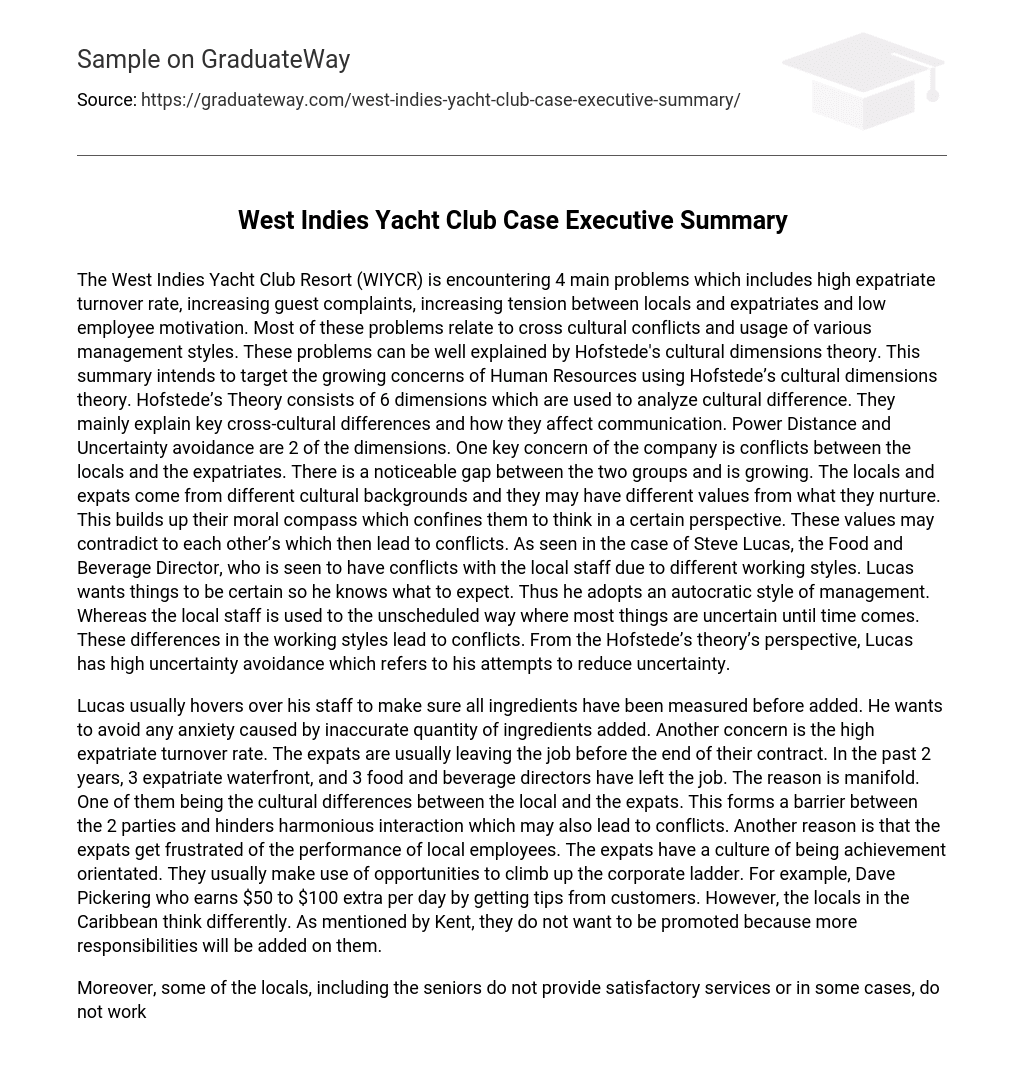The West Indies Yacht Club Resort (WIYCR) is encountering 4 main problems which includes high expatriate turnover rate, increasing guest complaints, increasing tension between locals and expatriates and low employee motivation. Most of these problems relate to cross cultural conflicts and usage of various management styles. These problems can be well explained by Hofstede’s cultural dimensions theory. This summary intends to target the growing concerns of Human Resources using Hofstede’s cultural dimensions theory. Hofstede’s Theory consists of 6 dimensions which are used to analyze cultural difference. They mainly explain key cross-cultural differences and how they affect communication. Power Distance and Uncertainty avoidance are 2 of the dimensions. One key concern of the company is conflicts between the locals and the expatriates. There is a noticeable gap between the two groups and is growing. The locals and expats come from different cultural backgrounds and they may have different values from what they nurture. This builds up their moral compass which confines them to think in a certain perspective. These values may contradict to each other’s which then lead to conflicts. As seen in the case of Steve Lucas, the Food and Beverage Director, who is seen to have conflicts with the local staff due to different working styles. Lucas wants things to be certain so he knows what to expect. Thus he adopts an autocratic style of management. Whereas the local staff is used to the unscheduled way where most things are uncertain until time comes. These differences in the working styles lead to conflicts. From the Hofstede’s theory’s perspective, Lucas has high uncertainty avoidance which refers to his attempts to reduce uncertainty.
Lucas usually hovers over his staff to make sure all ingredients have been measured before added. He wants to avoid any anxiety caused by inaccurate quantity of ingredients added. Another concern is the high expatriate turnover rate. The expats are usually leaving the job before the end of their contract. In the past 2 years, 3 expatriate waterfront, and 3 food and beverage directors have left the job. The reason is manifold. One of them being the cultural differences between the local and the expats. This forms a barrier between the 2 parties and hinders harmonious interaction which may also lead to conflicts. Another reason is that the expats get frustrated of the performance of local employees. The expats have a culture of being achievement orientated. They usually make use of opportunities to climb up the corporate ladder. For example, Dave Pickering who earns $50 to $100 extra per day by getting tips from customers. However, the locals in the Caribbean think differently. As mentioned by Kent, they do not want to be promoted because more responsibilities will be added on them.
Moreover, some of the locals, including the seniors do not provide satisfactory services or in some cases, do not work at all as mentioned by Pickering. The reason is the compensation system of the resort. It gives out pay raise every year regardless of individual performances. In addition, the local employment laws almost guaranteed jobs to the workers. Hence they were not concerned about impressing their superiors. They emphasized more on staying together with their coworkers rather than to excel and compete against each other. As seen by Hofstede’s theory, this shows that the Power Distance in the Caribbean is high. This refers that the lower hierarchy employees accept the power to be distributed unequally. This explains the big difference between the locals and expats in terms of power. To reduce this phenomenon, Kent uses a participative approach so his employees can have more power. This can be seen by willing to get his hands dirty and teaching the staff through behavior learning. The conflicts between expatriates and locals and high expatriate turnover rate need to be solved for the improvement of the resort. Appropriate management style and employment laws need to be revised.





